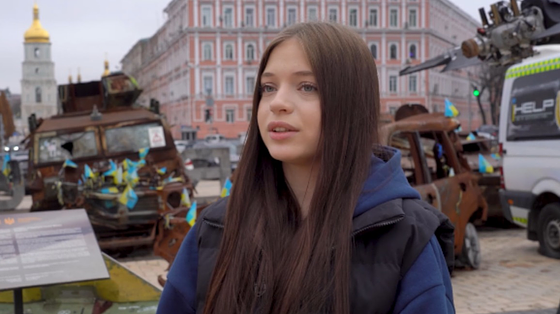Yevhen Tissen:

Before the war, there was a shop, a stall, but there was no pharmacy. The first-aid post (rural health post) used to operate in our area. When the war began, people left, everything was closed down. We had nowhere to go.
There was no money. Here we have our own house, our vegetable gardens, a barn and some livestock. We can make some kind of living here. We can cut a duck and here is our dinner. Self-grown potatoes, tomatoes, vegetables and fruit for children. It was all our own, homemade. We had nowhere to go. We could not leave everything here. We were not ready for that.
That is why we ran down to the cellar and hid there. We lived in my mother’s house, nine people. We lived all together as one big family.
Daughter Christina Tissen:

We hid in the cellar. Now there is only some jarred food there for long-term storage. We had a cast-iron stove in the corner. We hid here. There were mattresses, pallets, some sort of flooring. We spent some three or four nights there. When we came under shellfire from Grad rocket launchers for the first time, the girls took turns spending the night there. Otherwise, we would stay there for some three, four or five hours. A couple of times it happened so that we did not even have time to leave the house.
Father:
We heated the cellar all the time. The cellar is a cellar and we had to heat it. We survived thanks to that cellar. There were some explosion waves. The house got a crack going from the corner because of an explosion. The windowpanes shattered. I changed the window glass four times here. Then I gave it up. Nailed the windows up and that’s it. Well, why? What is the point of putting the window glass if the shelling continues?

Mother:
We did not leave the place for a single day. We stayed under the shelling all the time. It flew above and across us both there and back.
Mostly children slept in the cellar and I often slept in the house. Can you imagine nine people in the cellar? It’s difficult. Although when there was massive shelling, everyone slept there.
We took all the jars with food out from the cellar. We put some wood boards on the cinder blocks, placed the mattresses on top of the boards, padded the walls of the cellar with felt, put a cast-iron stove in the cellar. We also made an additional shelf on top, because we all did not fit. We slept like this: someone at the top level, someone on another shelf, but we could sleep. We cooked there and ate there too.
From 12 September 2014 to 31 December 2015, there was no electricity supply in the village, no power at all. We cooked food on whatever we could. We made open fires and we bought some gas. However, it was dangerous to buy gas amid the shelling because you don’t know where a shell can hit next time. We could be blown up not because of a shell, but because of a gas explosion, which would be sort of weird or embarrassing. In winter, we cooked on the stove.
People used to work and had their own earning, their own income. They counted on themselves. People have nowhere to work now. When all this began, my son said those words that did not come to my mind right at once. He put it this way: ‘It does not matter what government we have, it does not matter what kind of political system we have. Our destiny, our province is agriculture. We are going to continue farming the way we did before.’ That is the way it is. The only thing is that it is very difficult to be without jobs. You need to be looking for money in order to feed the kids.
Mines have been planted everywhere around the village. There is no work and all young people are unemployed. We get our pensions.
While in 2016 we were more supported by humanitarian organizations, now, by and large, we receive assistance from the Red Cross and from Akhmetov.
The village is cast off. Our village council remained on the other side. Geographically, the village belongs to Luhansk village council, and it is now in the “DPR”. And we still cannot be officially merged with Mykhailivka here.
We were transferred to Mykhailivka in matters of getting healthcare services. Somehow or other, we have been allowed to take a paper confirming that we live here. Well, and that’s it. There is still no water supply as before. There was no transport and there is still no transport. There was no healthcare post and there is still none. The only thing is that Doctors without Borders come once a month, but this is just for handing over some medicines.
There is no food store here. That is, to buy some food you have to go somewhere, even if you want to buy just some bread. That is why it is still impossible to say that we are recovering. To be honest, I’m not ready yet to buy some new roofing slate and cover the roof, because I don’t know what will happen next.
Any stressful conditions do not go unnoticed. Young people do not feel it, but older people do. Many people moved away leaving their homes behind. They took just their most essential possessions. People have nothing to return to.








.png)



